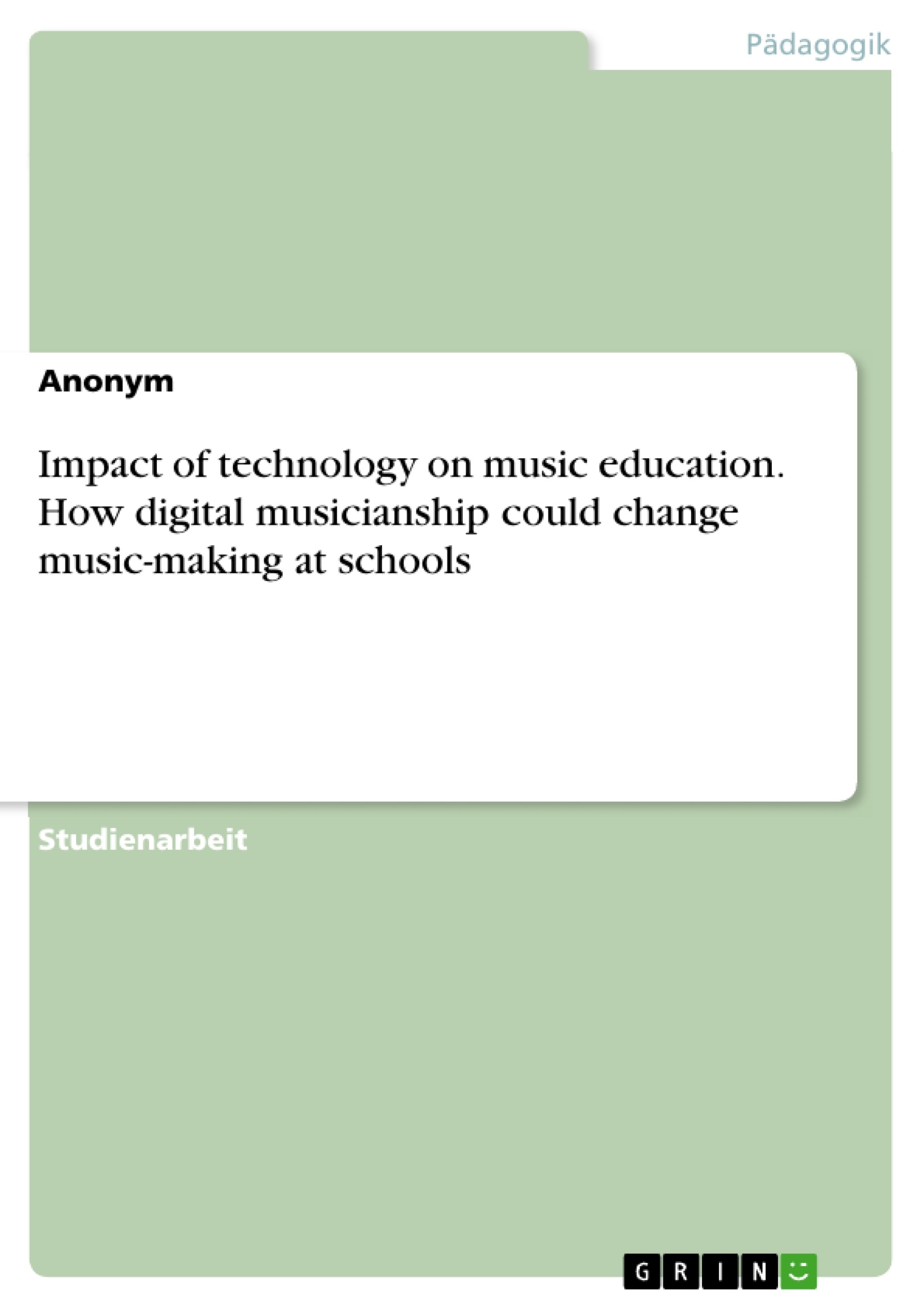Adorno claims that the invention of the record disc alienates the nature of music from human ontology. According to him, human life and music can not exist apart from time and space. However, globalization, web 2.0 or social networking has shown, that human social life is increasingly involved in international interaction. Even students' life has changed. The JIM study found out that 92% of German students (between the ages of 14 and 19) own their own smartphone(s). Due to that fact, students are able to share information with friends and consume media wherever and whenever they want. Moreover, students transform everyday life contents (in form of pictures, videos, recordings) into narratives, by publishing and interpreting personal information on social networks.
In comparison to that, turntablists transform musical contents (in form of records) into narratives, by interpreting and manipulating existing records. Consequently, media–technology has turned from a reproductive tool into a productive one. The technology-based formation of content became part of every students' social life and determines the way we listen, perform or compose music. Why did it not become part of German music classes?
This paper aims to determine the impact of technological progress on music education. The purpose of the study is to outline how music education could adopt music culture, which is increasingly driven by technological change. The following investigation is based on the assumption that new possibilities of technology–related music production can not only be taught theoretically. Consequently it is necessary to probe how technology–based musicianship can be implemented at schools. Unfortunately, the limited access to empirical data (concerning schools' equipment etc.) does not allow to develop concrete teaching concepts. Nevertheless, the developed conceptions may serve as approach that can be shaped according to different education–settings.
Inhaltsverzeichnis
- Introduction
- Recording technique and the history of turntablism
- Early ideas and experiments with the gramophone
- Pierre Schaeffer and 'musique concrète'
- Fluxus Movement
- Hip-Hop DJ's and turntablism
- Digital revolution
- Implications of technological change
- New technology and music
- Musical material
- Common authorship and democracy of sound
- Digital musicianship
- New technology and music education
- Rethinking music making at school
- Creativity
- Learning environments
- New technology and music
- Critical review
- The student's perspective
- Creative technology and music education: a question of ideology?
Zielsetzung und Themenschwerpunkte
Diese Arbeit zielt darauf ab, die Auswirkungen des technologischen Fortschritts auf die musikalische Bildung zu erforschen. Das Ziel ist es, zu beschreiben, wie die musikalische Bildung die durch den technologischen Wandel zunehmend geprägte Musikkultur adaptieren könnte. Die folgende Untersuchung basiert auf der Annahme, dass neue Möglichkeiten der technologiebezogenen Musikproduktion nicht nur theoretisch vermittelt werden können. Daher ist es notwendig zu untersuchen, wie technologiebasierte Musikalität an Schulen implementiert werden kann.
- Die Auswirkungen des technologischen Wandels auf die Musikgeschichte
- Die Bedeutung der Sampling-Technologie und ihre Relevanz für die DJ-Kultur, den Turntablismus sowie die Verwendung von "kreativen Apps"
- Die sich verändernde Rolle der Musikalität und ihre Auswirkungen auf die musikalische Bildung
- Die Bedeutung des sozialen Diskurses für das Verständnis von technologischem und musikalischem Fortschritt
- Die kritische Reflexion der Erkenntnisse aus verschiedenen Perspektiven
Zusammenfassung der Kapitel
Kapitel zwei veranschaulicht die Auswirkungen des technologischen Wandels auf die Musikgeschichte anhand des Fortschritts in der Aufnahmetechnik. Das Kapitel beleuchtet die Bedeutung der Sampling-Technologie und ihre Relevanz für die DJ-Kultur, den Turntablism sowie die Verwendung von "kreativen Apps". Kreative Anwendungen wie GarageBand halten an der Idee des Turntablismus fest. In dieser Arbeit wird der Begriff "digitale Musikalität" eingeführt, um zwischen Turntablismus und "app-basiertem Musikmachen" zu unterscheiden und bezieht sich ausschließlich auf die Verwendung von GarageBand-Software. Diese Arbeit beabsichtigt nicht, die technischen Merkmale von GarageBand zu analysieren.
Das folgende Kapitel analysiert die sich verändernde Rolle der Musikalität und ihre Auswirkungen auf die musikalische Bildung. Diese Überlegungen werden zeigen, dass technologischer und musikalischer Fortschritt nur im Verhältnis zum sozialen Diskurs verstanden werden kann. Kapitel vier reflektiert bereits erzielte Ergebnisse kritisch, indem es Ansichten aus verschiedenen Perspektiven abwägt und integriert.
Schlüsselwörter
Die Arbeit befasst sich mit den Themen der technologischen Entwicklung, der Musikalität, der musikalischen Bildung und der DJ-Kultur. Besondere Aufmerksamkeit wird dem Turntablismus, der Sampling-Technologie und der Verwendung von "kreativen Apps" wie GarageBand gewidmet. Die Arbeit untersucht die Auswirkungen des technologischen Wandels auf die Musikgeschichte, die sich verändernde Rolle der Musikalität und die Möglichkeiten, technologiebasierte Musikalität in die musikalische Bildung zu integrieren.
Häufig gestellte Fragen
Wie beeinflusst Technologie die Musikpädagogik?
Technologie wandelt Musik von einem rein reproduktiven Medium zu einem produktiven Werkzeug, wodurch neue Formen des Musikmachens wie Sampling und digitales Komponieren möglich werden.
Was ist "Digital Musicianship" (digitale Musikalität)?
Der Begriff beschreibt die Fähigkeit, Musik mithilfe digitaler Werkzeuge (wie GarageBand oder Apps) zu erschaffen, wobei der Fokus auf Kreativität statt auf traditioneller Instrumentenbeherrschung liegen kann.
Was ist Turntablism?
Turntablism ist die Kunst, Schallplattenspieler als eigenständige Musikinstrumente zu nutzen, um durch Techniken wie Scratching oder Mixing neue musikalische Narrative zu erzeugen.
Sollten Smartphones im Musikunterricht genutzt werden?
Da über 90% der Jugendlichen Smartphones besitzen, bietet deren Integration die Chance, an die Lebenswelt der Schüler anzuknüpfen und kreative Musikproduktion für alle zugänglich zu machen.
Welche Rolle spielt GarageBand im Bildungskontext?
Software wie GarageBand ermöglicht es Schülern, ohne jahrelanges Üben eines Instruments komplexe Kompositionen zu erstellen und fördert so die demokratische Teilhabe an Musik.
- Citation du texte
- Anonym (Auteur), 2015, Impact of technology on music education. How digital musicianship could change music-making at schools, Munich, GRIN Verlag, https://www.grin.com/document/323420



